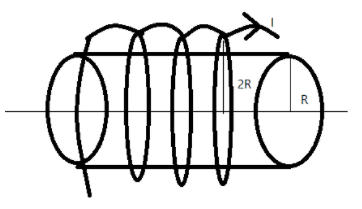Question
Question: A steady current \(I\) flows along an infinitely long hollow cylindrical conductor of radius \(R\). ...
A steady current I flows along an infinitely long hollow cylindrical conductor of radius R. This cylinder is placed coaxially inside an infinite solenoid of radius 2R. The solenoid has n turns per unit length and carries a steady current I. Consider a point P at a distance r from the common axis. The correct statements are: ( This question has multiple correct answers)
A. in the region 0<r<R, the magnetic field is non-zero,
B. in the region R<r<2R, the magnetic field is along the common on axis
C. in the region R<r<2R, the magnetic field is tangential to the circle of radius r, centred on the axis
D. in the region r>2R, the magnetic field is non-zero
Solution
We know that a current carrying conductor can produce magnetic fields around itself. And we also know that current can be produced by a varying magnetic field. The current produced is called induced current and its direction is given by right hand thumb rule.
Complete Answer:
Consider a hollow cylinder of radius R and an infinite solenoid of radius 2R to carry current I in the direction as shown in the figure below.

We know that the current in the solenoid induces a magnetic field in the hollow cylinder. Then, for any point r which 0<r<R, clearly, there exists a magnetic field. Thus option A is correct.
Due to the current in the solenoid, there is an induced current in the hollow cylinder. The current in the cylinder produces a magnetic field in the outer of the solenoid also. Then we can say that, for a point r>2R, there exists some magnetic field. Thus the option D is also correct.
Hence the correct answer is A. in the region 0<r<R, the magnetic field is non-zero, and D. in the region r>2R, the magnetic field is non-zero.
Note:
Here, option B and C are incorrect, as clearly, R<r<2R, it doesn’t lie on the common axis. Also, the magnetic field is a vector sum and hence it cannot lie on the tangent of the solenoid. We also know that direction of current and the direction of magnetic field are interrelated; when one is given the other can be found using the right hand thumb rule.
